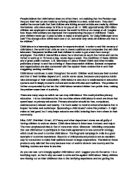“Do Stop and Searches Breach our Privacy?”
By Luke Warner
Since it was first introduced, the ‘stop and search’ method of countering crime has sparked a fierce debate as to whether these searches are morally right. Happening almost daily, the practice continues to be very controversial, with many claiming that ‘stop and searches’ breach our right to privacy. In the next couple of paragraphs, I shall attempt to answer the question “do stop and searches breach our privacy?” and learn a little more about the controversial topic.
Depending on where in the UK one lives, one is likely to be stopped and searched at least once in their life by a police officer – it has become an inevitable fact. When told by an officer that they are going to be searched in public, a person is given a number of key rights and responsibilities. Both the former and the latter are obvious: the right to be told the officer’s name and police station, the right to receive a ‘receipt’ from the officer about the search, the right to not be strip searched in public, and the right to be searched by an officer of the same sex, as well as the responsibility to comply with the police, to not resist or abuse the officers, to take off all garments when asked to (only up to a jacket; never trousers or a shirt), and the responsibility to tell them your name and address.







